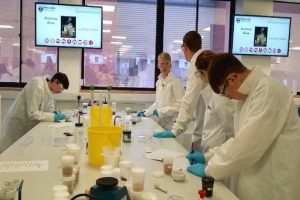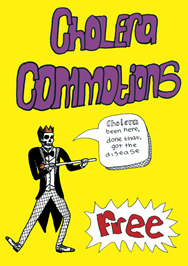Ulrike Thomas is a researcher based in the Centre for Learning and Teaching (CfLaT) at Newcastle University. Here she and her collaborators at Learning Arc tell us about the ESRC IAA funded project that explored working with archives and secondary schools.
Learning Arc is a group of North East archive educators whose members meet regularly to share good practice in archive education. They are dedicated to developing a deeper understanding of local heritage through the rich resource of archives. Regular discussions between members revealed that archives are being underused by schools- in particular secondary schools – with the archive educators struggling to find ways to break down the barriers and work on sustained projects with this older age group of students. In order to find ways to challenge this situation, the members of Learning Arc decided they would benefit from training on innovative educational practises, thus enabling them to develop projects which address the specific needs of secondary schools.
Academics and researchers from CfLaT have been working with schools over many years on the development of innovative pedagogies to tackle the issue of student (dis)engagement. Most recently their research has focussed on Project-Based Learning using community resources- a process known as Community Curriculum Making. Central to this approach is that students ‘go places, meet people and do and make things’ and that there is an external audience for the work giving it value and ensuring its quality. The Leaning Arc members and CfLaT successfully applied for funding to run a project that included:
- Training delivered by CfLaT which introduced the Learning Arc members to innovative curriculum approaches/pedagogies as well as tools for planning and evaluation.
- Funding to support two of the archives to develop pilot projects with two secondary schools.
- Evaluation of the impact of the projects on the archivists, students and teachers.
The pilot projects: initial planning
Initial planning took place using the tools and Community Curriculum principals introduced during the training. Two schools local to the archives were then approached to gauge interest in the projects. This led to the involvement of the Head of Humanities at Berwick Academy and a Design and Technology teacher at George Stephenson High School, Killingworth.
The initial planning was crucial as a starting point for discussions with these teachers, however it was made clear that their collaboration was vital to guarantee that the projects addressed the agendas and working practices of the schools. Interestingly the schools developed two very different projects over very different timeframes, yet the planning tools ensured that both were underpinned by the key principals of Community Curriculum Making. Further planning involved the experts who would be working with the students on their final products. This was particularly important in ensuring the feasibility of what was being asked of the teachers and students.
Example project: From Cholera to Comic
A group of Year 9 students at Berwick Academy took part in a 4 day project which focussed on the cholera outbreaks in Berwick from 1832 to 1854. The students started with a visit to Newcastle University where they worked with the Special Collections Department and took part in a science workshop in the Medical School. This was followed by 3 days at Berwick Record Office and Museum researching the local Cholera outbreaks. The students were introduced to the archives, visited local sites affected by the outbreaks and heard about a volunteer’s research on one of the victims. They then worked with Comics Boss Lydia Wysocki on the production of a comic which would introduce the subject to a teenage audience. The comic has been published and distributed locally and the project showcased at the Berwick Literary Festival.
The project achievements
Overall this project has been a great success for all those involved :
- The relationship of the archive educators with the university facilitated access to secondary schools otherwise hard to reach.
- The training resulted in collaboratively designed projects based on community curriculum principals which addressed the agendas and needs of the secondary schools thus ensuring their success.
- The students developed their knowledge of archives and their local history through first-hand experience with primary sources.
- ‘Going places, meeting people and doing and making things’ has broadened the horizons of the students, helping them to shape more complex identities and inform their aspirations.
Most importantly it has forged links between the university, local archives and schools and was a memorable and enjoyable introduction to archives for the students.
To view the comic: http://appliedcomicsetc.com/portfolio/cholera/
This blog post is a shortened version of an original magazine article published in ALES (Archives for Learning and Education)
Images courtesy of Berwick Record office


